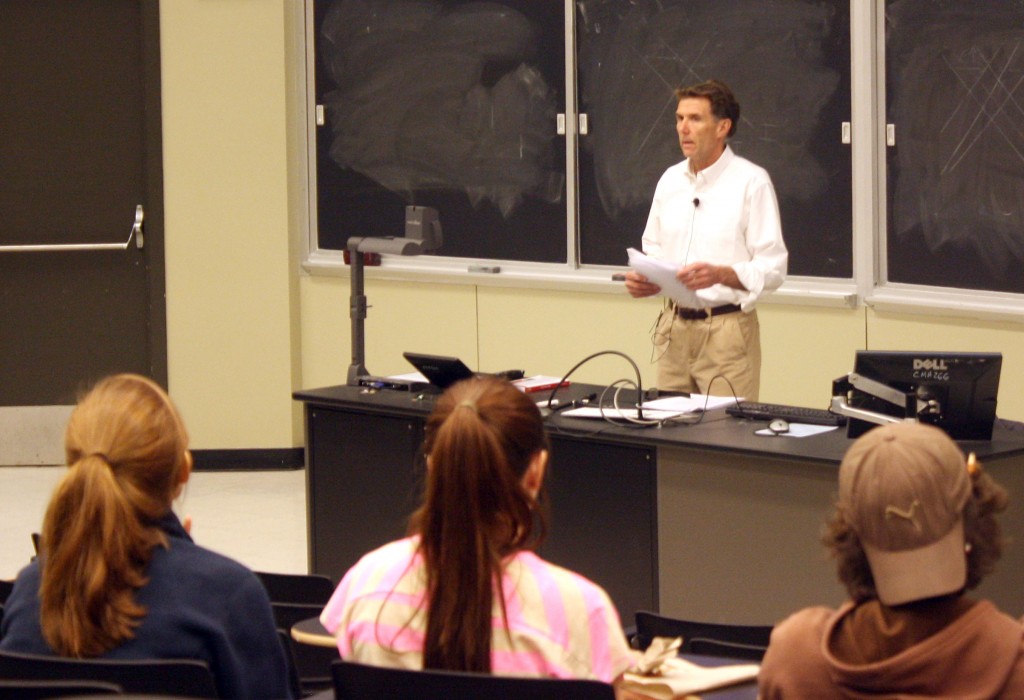
Binghamton University’s location atop the massive Marcellus Shale natural gas deposit makes it a hotspot of protest and discussion regarding hydraulic fracturing, a natural gas drilling process that continues to be debated in New York.
The Student Environmental Action Coalition (SEAC) invited Tom Wilber, local journalist and author of “Under the Surface: Fracking, Fortunes, and the Fate of the Marcellus Shale,” to continue the conversation. About 50 students, faculty and community members attended the Wednesday evening talk in Lecture Hall 2.
“Under the Surface” is told from the perspective of several characters, and focuses on the policy decisions and technology associated with fracking. The author read segments from his book and answered audience members’ questions.
Wilber worked as an environmental and health reporter for the Press & Sun-Bulletin, Binghamton’s local newspaper, for 17 years.
His narrative followed shale gas development in New York and Pennsylvania since 2008. Wilber was one of the first writers to cover the drilling events in Dimock, Penn., where water contamination resulting from fracking became a rallying cry for anti-fracking campaigners.
Wilber said that as a journalist, he has not taken a stand on fracking.
“While I have no position to share on fracking, I am pro-transparency,” Wilber said.
According to Wilber, New York and Pennsylvania landowners responded differently to the idea of fracking. In Pennsylvania, landowners “bought into” the idea of fracking and took a “learn as we go” approach. New York residents decided to “hold everything” when the idea of fracking was introduced and many were warned not to lease their land to oil companies.
Wilber has observed the effects of fracking as well as the anti-fracking movement associated with its introduction to New York and Pennsylvania.
“As a reporter, I have seen how grassroots activism has made a huge impact on the discussion,” Wilber said.
He made reference to the movie “Gasland,” a film by Josh Fox that accelerated the anti-fracking movement with footage and testimonials of landowners who leased their land to oil companies.
Wilber said that markets will determine the future of shale gas, as increasing demand will cause increased prices of shale gas, which will lead to more oil drilling.
SEAC President Jenna Fierstein said Wilber’s efforts to uncover all sides of the fracking story are consistent with the club’s ideals.
“He’s really pro-transparency, which is what we’re all about,” said Fierstein, a senior double-majoring in biology and environmental policy and law.
Environmental groups like SEAC are associated with an antagonistic treatment of fracking, but Fierstein said her group hopes to educate the public about all aspects of environmental issues.
“It’s important that people know as much about it as possible,” Fierstein said. “We don’t want people to get this image of us as hippies walking around holding signs.”
Melissa Liberti, another SEAC member, agreed with how environmental groups are perceived.
“They think we’re just going to put down all the frackers,” said Liberti, a junior majoring in sociology.
SEAC members advertised in local restaurants and offices and said they were pleased with the turnout. They said they want SEAC members and BU students in general to be more connected with the local community.
“We care about the people, we care about the land, regardless of where we are,” Fierstein said.
Wilber recently traveled to speak to students at SUNY College of Environmental Science and Forestry Monday and will speak next at the University of Rochester.
He said the decisions made in New York this year regarding fracking legislation and the revision of SGEIS — the New York Department of Environmental Conservation’s supplemental generic impact statement — will play an important role in deciding the future of fracking.
“It’s going to be a very interesting year,” Wilber said.
Wilber’s book is now available for purchase in the BU book store, but will be officially released on May 8.


